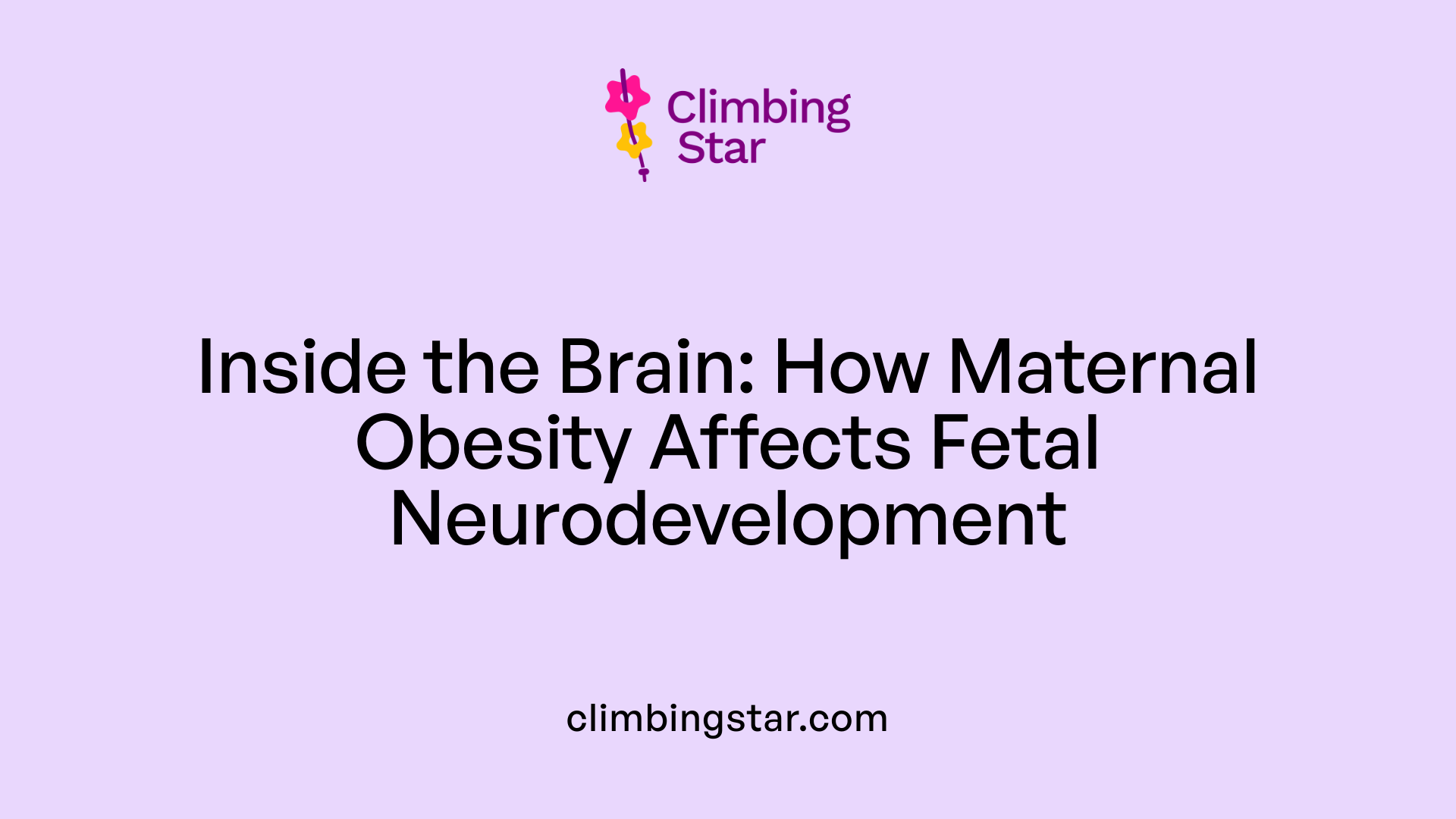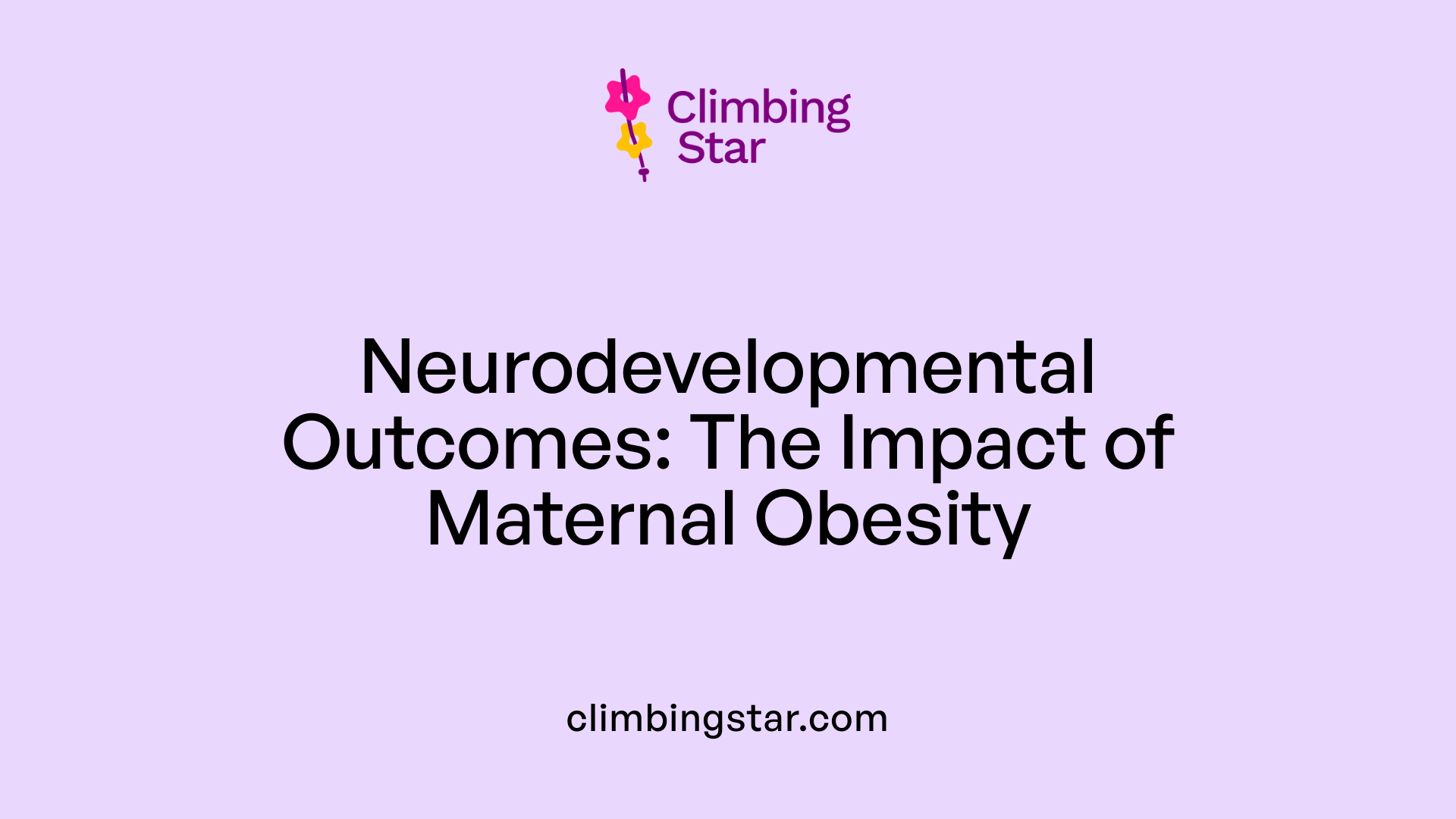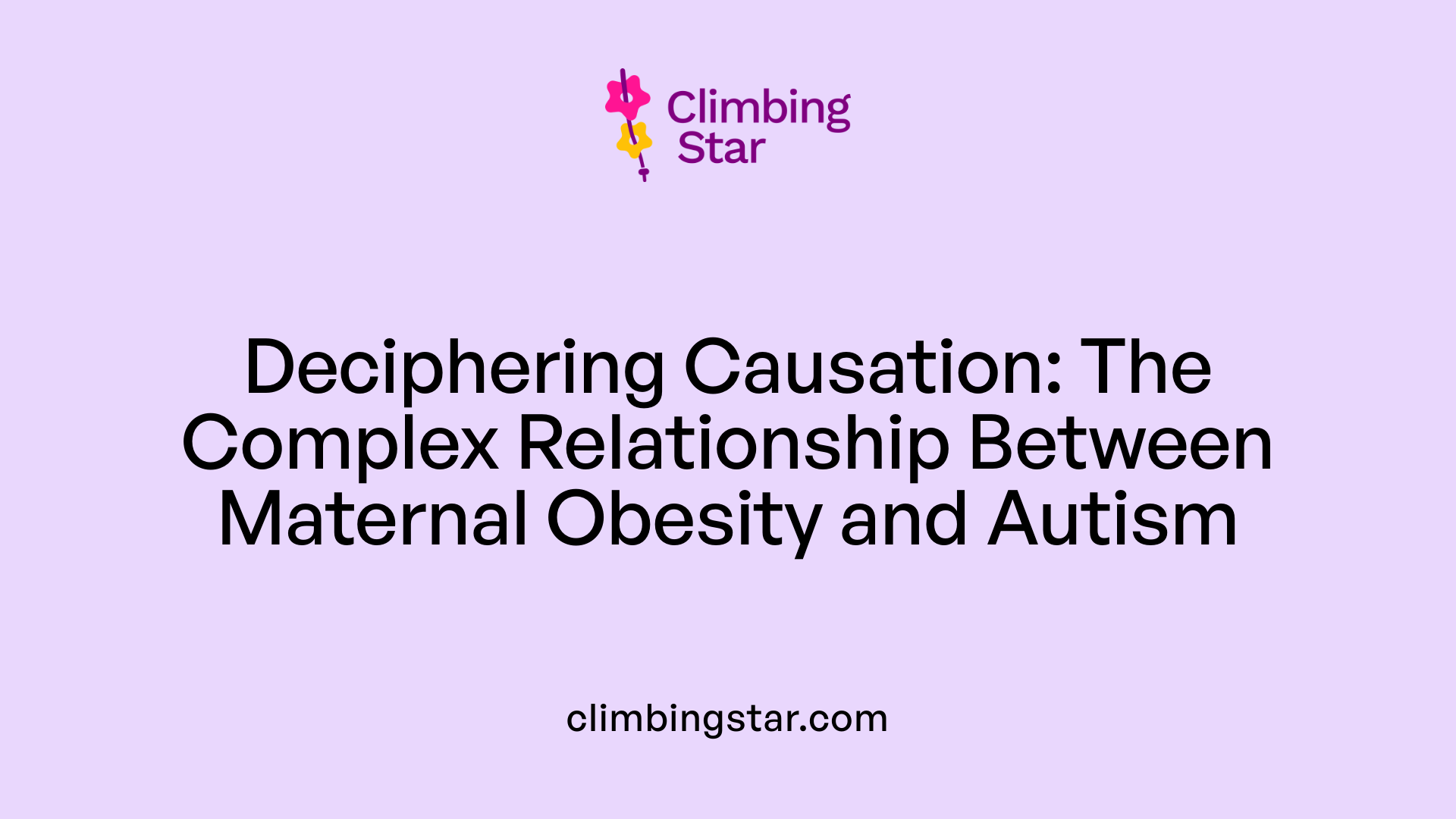Understanding the Link Between Maternal Health and Child Development
Recent scientific research underscores a significant connection between maternal obesity prior to and during pregnancy and the increased risk of autism spectrum disorder (ASD) and other neurodevelopmental conditions in offspring. As maternal health becomes an increasingly focal point in public health discussions, understanding the biological mechanisms, epidemiological evidence, and potential interventions is vital for promoting healthier pregnancies and improving child developmental outcomes.
The Epidemiological Evidence Linking Maternal Obesity and Autism
 Numerous scientific studies and meta-analyses have explored the connection between maternal obesity and the likelihood of autism spectrum disorder (ASD) in children. A systematic review spanning over 3.68 million mother-child pairs identified that maternal obesity before and during pregnancy significantly increases ASD risk. Specifically, maternal preconception obesity is associated with approximately a 42% increased risk, while obesity during pregnancy doubles this risk, indicating a clear dose-response trend.
Numerous scientific studies and meta-analyses have explored the connection between maternal obesity and the likelihood of autism spectrum disorder (ASD) in children. A systematic review spanning over 3.68 million mother-child pairs identified that maternal obesity before and during pregnancy significantly increases ASD risk. Specifically, maternal preconception obesity is associated with approximately a 42% increased risk, while obesity during pregnancy doubles this risk, indicating a clear dose-response trend.
Research highlights that children born to overweight or obese mothers face higher chances of ASD, with relative risks rising with severity of maternal weight issues. For example, children of obese women are about 36% more likely to develop ASD than those of mothers with normal BMI. Moreover, each 5 kg/m² increase in maternal BMI is linked to a 16% rise in ASD risk, underscoring a linear dose-response relationship.
These findings are bolstered by epidemiological evidence showing that maternal conditions like pregestational and gestational diabetes, often associated with obesity, amplify the risk—sometimes more than fourfold when combined with obesity. Biological mechanisms proposed include inflammatory processes, hormonal imbalances, oxidative stress, and alterations in fatty acid metabolism that can affect fetal brain development.
Interestingly, research also shows paternal obesity independently influences autism risk. A Danish study reported that children of obese fathers (BMI ≥30) have about a 73% higher risk of ASD, with similar associations seen for Asperger disorder. This indicates that familial and genetic factors may partly underpin these links.
However, some recent studies caution against assuming a purely causal relationship. Family-based research suggests that shared genetic and environmental factors, rather than maternal obesity alone, may explain some of the observed associations. Such findings highlight the importance of considering confounding factors in epidemiological research.
In summary, both maternal and paternal obesity contribute to increased autism risk, with evidence pointing toward complex interactions of genetic, environmental, and biological influences.
| Study/Meta-Analysis | Sample Size | Main Findings | Additional Notes |
|---|---|---|---|
| Systematic Review & Meta-Analysis (42 studies) | 3.68 million mother-child pairs | Maternal obesity increases ASD risk by about 100%, with a dose-response trend | Emphasizes importance of maternal weight management |
| Danish Family Study | >1 million children with sibling comparisons | Shared familial factors influence autism risk more than direct causal effects | Family studies highlight genetic/environmental confounding |
| Paternal Obesity Study | Data from Denmark and other sources | Paternal obesity associated with increased ASD risk (OR ~1.73) | Suggests parental health beyond maternal factors |
This wealth of research underscores the importance of managing weight before and during pregnancy to mitigate neurodevelopmental risks in children.
Biological Mechanisms Underpinning Maternal Obesity’s Influence on Fetal Neurodevelopment

What are the biological mechanisms linking maternal obesity to an increased risk of autism in offspring?
Maternal obesity influences fetal brain development through several interconnected biological pathways. One major factor is inflammation. Obesity leads to a state of chronic low-grade systemic inflammation, which can affect the developing fetal brain. This inflammation may interfere with neural cell growth and synapse formation, essential processes for healthy neurodevelopment.
In addition to inflammation, hormonal and metabolic imbalances play a crucial role. Obese women often experience insulin resistance and elevated blood sugar levels, creating an adverse metabolic environment for the fetus. These disturbances can alter the normal development of neural circuits, increasing the risk of autism.
Oxidative stress is another key mechanism. The heightened inflammation and metabolic dysregulation promote the production of reactive oxygen species, leading to cellular damage in the fetal brain. This damage disrupts neurodevelopmental processes critical for cognitive and behavioral functions.
Furthermore, maternal obesity can cause epigenetic modifications—heritable changes in gene expression that do not alter the DNA sequence but influence how genes are turned on or off. Such epigenetic alterations, including DNA methylation changes, can affect neurodevelopmental genes, increasing autism susceptibility.
Overall, these mechanisms—stemming from inflammation, metabolic disruption, oxidative stress, and epigenetic changes—work together to impact fetal brain development, establishing a biological foundation for increased autism risk associated with maternal obesity.
Impact of Maternal Obesity on Neurodevelopmental Outcomes in Children
 Maternal obesity during pregnancy has been linked to a heightened risk of several neurodevelopmental disorders in offspring, notably autism spectrum disorder (ASD), attention deficit hyperactivity disorder (ADHD), and broader behavioral challenges. Research indicates that children born to obese mothers are approximately 36% more likely to develop ASD, with the risk increasing further if maternal obesity co-occurs with conditions like gestational diabetes. Additionally, there is evidence of a 32% increased risk for ADHD among these children, emphasizing the broad neuropsychiatric impact.
Maternal obesity during pregnancy has been linked to a heightened risk of several neurodevelopmental disorders in offspring, notably autism spectrum disorder (ASD), attention deficit hyperactivity disorder (ADHD), and broader behavioral challenges. Research indicates that children born to obese mothers are approximately 36% more likely to develop ASD, with the risk increasing further if maternal obesity co-occurs with conditions like gestational diabetes. Additionally, there is evidence of a 32% increased risk for ADHD among these children, emphasizing the broad neuropsychiatric impact.
The intrauterine environment in obese pregnancies often features elevated levels of inflammatory cytokines such as interleukin-6 (IL-6) and tumor necrosis factor-alpha (TNF-alpha). These inflammatory markers can cross the placental barrier and influence fetal brain development. Animal studies have shown that such intrauterine inflammation can impair neurogenesis and disrupt neural circuit formation, leading to behavioral and cognitive deficits reminiscent of those observed in human neurodevelopmental disorders.
Structural brain changes are also observed in offspring of obese mothers. Imaging studies reveal alterations in white matter integrity, especially in regions responsible for social behavior and executive functions. These disruptions in neural pathways are thought to underlie some of the behavioral problems and learning difficulties associated with maternal obesity.
The biological mechanisms behind these effects include not only inflammation but also hormonal imbalances, oxidative stress, and perturbations in fatty acid metabolism. These factors interfere with crucial processes like synaptogenesis and myelination, which are vital during critical periods of brain development.
Research suggests that interventions such as omega-3 fatty acid supplementation and antioxidants during pregnancy may help reduce inflammation and protect fetal brain development. Ongoing studies aim to refine strategies to mitigate the neurodevelopmental risks associated with maternal obesity.
| Risk Factors | Impact | Underlying Mechanisms | Potential Interventions |
|---|---|---|---|
| Maternal obesity | Increased ASD and ADHD risk | Inflammation, hormonal imbalance | Omega-3 fatty acids, antioxidants |
| Co-occurrence with diabetes | Higher likelihood of ASD | Epigenetic changes, metabolic disruption | Weight management, anti-inflammatory treatments |
| Elevated cytokines during pregnancy | Brain structure alterations | Cytokine exposure affecting brain regions | Anti-inflammatory therapies |
Epidemiological Studies, Confounding Factors, and the Complexity of Causation
 Several large-scale studies and meta-analyses have examined the link between maternal BMI and autism spectrum disorder (ASD). These investigations reveal a pattern where both underweight and obese maternal conditions are associated with increased ASD risk in children.
Several large-scale studies and meta-analyses have examined the link between maternal BMI and autism spectrum disorder (ASD). These investigations reveal a pattern where both underweight and obese maternal conditions are associated with increased ASD risk in children.
A comprehensive meta-analysis of over 3.6 million mother-child pairs across 42 studies found that maternal obesity during pregnancy raises the likelihood of ASD by approximately 36%, with even higher risks observed among severely obese women. The research also identified a linear dose-response relationship, indicating that each 5 kg/m2 increase in maternal BMI elevates the child's ASD risk by about 16%. This suggests that as maternal BMI moves away from the normal range, particularly toward obesity, the risk of ASD in offspring increases.
Additional studies highlight that the association is not limited to maternal weight alone. Conditions like maternal preeclampsia, gestational diabetes, and metabolic issues related to obesity further heighten the risk. Interestingly, paternal obesity also appears to influence autism likelihood, with some research indicating a 73% increased risk of ASD in children of obese fathers.
Understanding these findings involves recognizing the influence of shared genetics and environmental factors. Many researchers emphasize that familial patterns complicate the picture. For instance, studies of families with multiple children suggest familial genetic predispositions might partly account for observed associations, rather than direct causal effects of maternal BMI.
To better differentiate correlation from causation, recent research involves sibling comparison studies and analyses controlling for environmental factors. These approaches aim to isolate the unique impact of maternal BMI from shared genetics and environment. Evidence from such work suggests that although maternal BMI correlates with ASD risk, it is likely one component within a complex interplay of genetic, environmental, and biological factors.
In conclusion, the evidence indicates that maternal BMI, especially at both ends of the spectrum, is associated with increased autism risk. However, disentangling direct causative effects from shared familial factors remains a significant challenge, underscoring the complexity of neurodevelopmental outcomes.
| Study Type | Main Findings | Additional Notes |
|---|---|---|
| Meta-analysis | Over 3.6 million pairs; 28%-36% increased ASD risk with maternal overweight/obesity | Identified dose-response relationship; role of metabolic conditions |
| Family/Recurrence | Familial factors influence autism risk | Shared genetics possibly confound observed associations |
| Paternal Obesity | 73% higher ASD risk | Suggests maternal and paternal health both play roles |
| Sibling Studies | Familial confounders weaken causal argument | Important for understanding true causal links |
Understanding the relationship between maternal BMI and autism requires considering these various factors and research approaches. While there is a clear association, establishing direct causality involves complex, disentangled analysis that continues to evolve.
Genetics, Shared Environment, and Their Role in Autism Risk
What does current research say about the impact of maternal health, particularly obesity, on neurodevelopmental outcomes like autism?
Recent studies highlight a significant connection between maternal health before and during pregnancy—especially obesity—and neurodevelopmental conditions in children. Maternal obesity before conception is associated with roughly a 36% increased risk of autism spectrum disorder (ASD) in offspring, with this risk escalating further if the mother’s body mass index (BMI) is in the overweight or obese range. For instance, children of obese mothers have about 36% higher chances of developing ASD compared to children of mothers with normal weight.
Meta-analyses involving over 3.6 million mother-child pairs reveal that maternal obesity during pregnancy approximately doubles the risk of ASD (a 2.23-fold increase). Interestingly, the risk increases with the degree of maternal weight gain—each 5 kg/m² increase in BMI correlates with a 16% higher chance of ASD.
It is believed that these associations are driven by intrauterine mechanisms such as low-grade systemic inflammation, hormonal imbalances, and metabolic disturbances like oxidative stress. These factors might disrupt fetal brain development by affecting gene expression and neural circuitry. In fact, research in animal models shows that maternal obesity causes epigenetic modifications—such as changes in DNA methylation—in offspring, which can interfere with neural genes like Homer1, influencing behaviors similar to those seen in ASD.
Obesity often occurs alongside gestational diabetes, which research shows further increases the risk of neurodevelopmental issues in children, including ASD. The biological pathways may involve inflammation and immune activation that impair fetal brain development.
While maternal BMI has a notable impact, studies also explore the influence of paternal health on offspring neurodevelopment. Paternal obesity has been associated with increased risks of ASD and Asperger disorder, with one study indicating a 73% higher likelihood of autistic disorder and more than double the risk for Asperger’s. These findings suggest that shared familial and genetic factors contribute significantly to autism risk alongside maternal health factors.
To help interpret these findings, it’s important to differentiate between correlation and causation. Studies that examined multiple siblings indicate that familial factors—genetic or environmental—might explain much of the observed associations. For example, children with autism often have relatives with related conditions, pointing toward shared genetic or environmental influences rather than direct causality from maternal health alone.
In summary, maternal obesity is a modifiable factor strongly linked to increased risks of neurodevelopmental disorders like ASD. It underscores the importance of healthy preconception and prenatal care, bolstered by ongoing research to unravel the complex genetics and environment interactions influencing child neurodevelopment.
Summary and Future Directions
The growing body of evidence highlights a complex relationship between maternal obesity and the risk of autism spectrum disorder and other neurodevelopmental conditions in children. While biological mechanisms such as inflammation, hormonal imbalances, and epigenetic modifications offer plausible explanations, confounding factors like shared genetics and environmental influences also play a significant role. Public health strategies focusing on maternal weight management before and during pregnancy, alongside further research into mechanistic pathways and gene-environment interactions, are essential for developing targeted interventions. Addressing maternal obesity not only benefits maternal health but also has profound implications for optimizing neurodevelopmental outcomes in future generations.
References
- The Association of Maternal Obesity and Diabetes With ...
- Maternal obesity doubles the risk of developing autism in ...
- Obesity, Diabetes in Mom Increases Risk of Autism in Child
- JABSOM Researchers Discover Link Between Maternal ...
- Giant study questions link between autism and maternal ...
- Asthma, obesity during pregnancy linked to autism in children
- Parental Obesity and Risk of Autism Spectrum Disorder
- Obesity in mums doubles the risk of autism in babies






